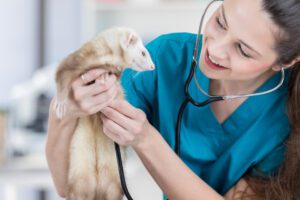The world of exotic pets is vast and fascinating, and ferrets, with their playful and inquisitive nature, have become a popular choice among pet lovers. As a responsible pet owner, ensuring your ferret’s health and well-being is a top priority, and that includes understanding vaccination needs. A question we often hear is, “Do Ferrets Need Rabies Shots?”
Understanding Rabies in Ferrets
Rabies is a deadly disease that is primarily transmitted through the bite of a rabid animal. Although it is more common in wild animals, our pets can contract the disease if they come into contact with infected wildlife or a pet dog or cat infected with rabies.
Can Ferrets Get Rabies?
The simple answer is yes. Ferrets are susceptible to many diseases that affect other mammals, including rabies. However, the incidence of rabies in ferrets is low due to their typically indoor lifestyle and existing vaccination practices.
Importance of Rabies Vaccination
Rabies is almost always fatal when symptoms appear, making prevention important. Vaccination protects your ferret from disease and helps prevent potential human exposure if your pet comes into contact with a rabid animal. According to Louisiana law, ferrets over 3 months of age must be vaccinated against rabies.
Do Ferrets Need the Rabies Vaccine?
Now, on to the big question – Do ferrets need the rabies vaccination? According to the National Association of State Public Health Veterinarians (NASPHV), ferrets should receive rabies vaccinations. This recommendation is also supported by leading veterinary experts and the Avian and Exotic Animal Hospital of Louisiana.
Current Rabies Vaccination Guidelines for Ferrets
Ferrets should receive their first rabies shot at three months of age, followed by annual boosters. This schedule ensures that they maintain immunity throughout their lives.
Possible Side Effects of Rabies Vaccination in Ferrets
As with all vaccines, the rabies shot can cause minor side effects in ferrets, such as local swelling or a mild fever. Serious reactions to the vaccine are rare. Reaction symptoms occur within 10-20 minutes and may cause dry heaves, vomiting and/or diarrhea. Always consult your veterinarian if you notice any changes in your ferret’s health after vaccination.
Your Ferret’s Health: What Else To Consider?


While vaccinations are important, they are only one aspect of your ferret’s overall health plan. Ferrets should be on monthly heartworm prevention because they are just as susceptible to heartworms as dogs and cats. Flea prevention may be necessary if other pets in the household have fleas or your ferret(s) is allowed to play outside on the grass. Ferrets should be fed a high-quality ferret kibble or a high-quality low-fat cat food.
Regular Vet Check-ups and Health Screening
Regular vet visits are important for early detection of common ferret ailments. The Avian and Exotic Animal Hospital of Louisiana offers a comprehensive check-up and health evaluation for ferrets. Health checks may include blood tests and/or x-rays to check for some of the common ferret diseases such as Insulinoma, Cardiomyopathy, Lymphoma and Adrenal Gland Disease.
Preventive Care and the Role of Immunizations
Besides rabies, ferrets should also receive other vaccinations, such as Canine Distemper. Preventive care, including heartworm prevention, a balanced diet, mental stimulation, and exercise, all play an important role in maintaining your ferret’s health.
Ensuring your ferret’s health and happiness involves making informed decisions about their care, including understanding their vaccination needs. For more information or to schedule an appointment, call (504) 455-6386. Our dedicated team at the Avian and Exotic Animal Hospital of Louisiana is always ready to help your exotic pet thrive! Vaccinating your ferret against rabies not only protects their health but also contributes to the well-being of your family and community. When it comes to rabies, prevention is truly the best cure.


